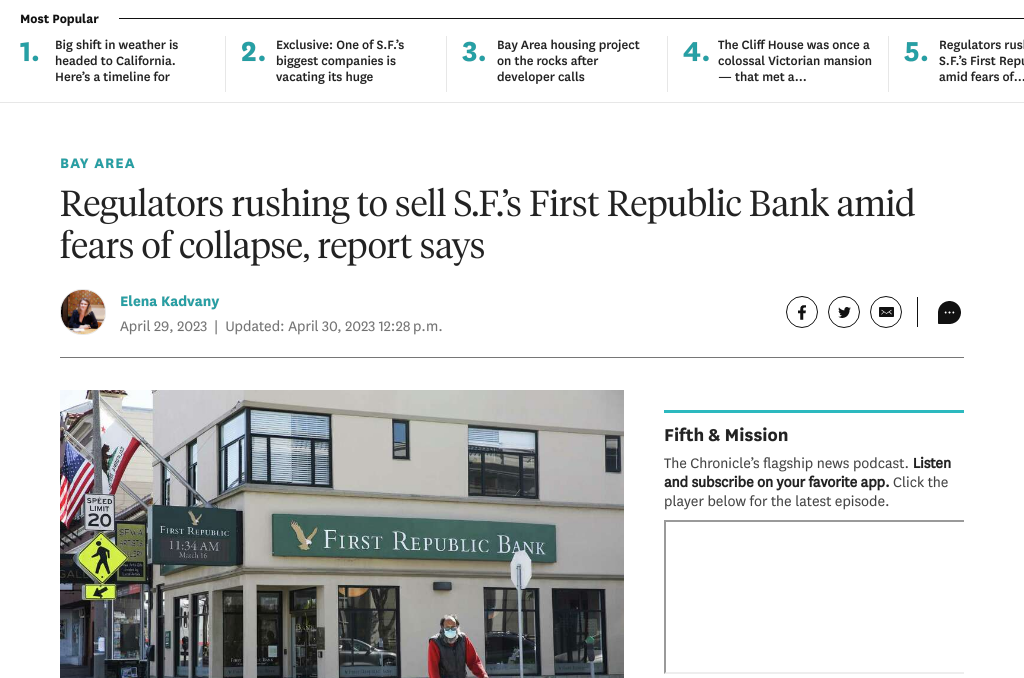Federal regulators are working to find a buyer for First Republic Bank, a San Francisco-based lender, as the bank’s stock continues to plummet.[0] The bank’s shares dropped by roughly 75% last week after it was revealed that customers withdrew over $100 billion in deposits during the recent banking sector turmoil. A $30 billion rescue package from 11 of the largest banks in the US in March was not enough to quell investors’ worries about the bank’s finances.[0] First Republic Bank is likely in its last day as a going concern, and its stocks have plunged since the company’s earnings announcement showed a loss of $100 billion in deposits in just one month after the Silicon Valley Bank’s collapse triggered a flight from several large regionals.[1] The development came days after First Republic Bank’s stock plunged when the bank said its customers withdrew $102 billion in the first quarter of the year, more than half of the $176 billion it held in deposits at the end of 2022.[2] It has been scrambling to shore itself up with $92 billion in loans from the government, as well as a $30 billion temporary infusion from a consortium of big banks, including JPMorgan Chase, PNC, and Bank of America.[2] Preventing a government takeover can be achieved through a sale to a larger bank.[2]
Federal regulators have asked several high-powered banks, including JPMorgan Chase, PNC Financial Services Group, US Bancorp, and Bank of America to submit final bids for First Republic Bank by Sunday after gauging initial interest earlier in the week.[3] If no deal with a private bank is reached, the Federal Deposit Insurance Corp. (FDIC) might need to take full ownership of First Republic itself. First Republic Bank can be brought under the control of FDIC, which can subsequently sell its assets to another private bank in a prompt manner. If no agreement is reached, regulators have the option of seizing First Republic and taking ownership of the bank.
The fall of Silicon Valley Bank brought immense stress upon the 29th-largest US bank, Signature Bank, which ultimately collapsed. Last month, the US faced banking sector issues as Silicon Valley Bank, ranked as the 16th largest lender, failed – marking the largest US bank collapse since 2008. The impact of the failure was not contained to Silicon Valley Bank, and share prices of many midsize banks tumbled. First Republic, similar to Silicon Valley Bank, is a medium-sized lender in the United States.[4] In March, a group of 11 US banks stepped forward to pump $30bn into First Republic in an attempt to stabilize the business.[5] JP Morgan was among them.[6]
If JP Morgan were to acquire First Republic Bank, it would need a special government waiver to add more to the more than 10% of all US bank deposits it already holds. JPMorgan is one of the few large banks that has accumulated over 10% of deposits across the country, which disqualifies them from acquiring another institution that takes deposits according to US regulations.[6] To enable the largest bank of the country to expand further, the authorities would need to make a special exemption.[7]
The FDIC wants to avoid another full receivership, and is not concerned with the preferred equity or debt recovery.[4] As investors in First Republic, all forms of capital will suffer impairment.[4] The FDIC aims to prevent further depletion of its deposit insurance fund, which has already suffered a loss of $22.5 billion due to the collapse of regional banks.[4] That is why discussions are around pooling equity from several banks to capitalize some sort of bankruptcy remote vehicle where the First Republic Bank assets can be dumped.[4] The First Republic auction may end a tumultuous period for mid-sized US banks.[3] Following the collapse of Silicon Valley Bank earlier this year, the focus has shifted towards First Republic as the most vulnerable aspect of the US banking industry.[3] The bank’s stocks plummeted by 90% in the previous month, and worsened even more this week due to First Republic’s revelation of their critical condition.[3]
0. “Federal regulators race to seize and sell First Republic Bank” ABC News, 29 Apr. 2023, https://abcnews.go.com/Business/federal-regulators-race-seize-sell-republic-bank/story?id=98962248
1. “Pre-Farewell to First Republic” The American Prospect, 28 Apr. 2023, https://prospect.org/economy/2023-04-28-pre-farewell-first-republic/
2. “Regulators rushing to sell S.F.’s First Republic Bank amid fears of collapse, report says” San Francisco Chronicle, 29 Apr. 2023, https://www.sfchronicle.com/bayarea/article/first-republic-bank-17994980.php
3. “Big banks including JPMorgan Chase, Bank of America asked for final bids on First Republic” CNBC, 29 Apr. 2023, https://www.cnbc.com/2023/04/29/first-republic-frc-jpmorgan-chase-bank-of-america-asked-for-bids.html
4. “First Republic: When Preferred Equity Goes To Zero, Part 2 (NYSE:FRC)” Seeking Alpha, 29 Apr. 2023, https://seekingalpha.com/article/4598081-first-republic-when-preferred-equity-goes-to-zero-part-2
5. “First Republic makes last ditch bid to find rescue deal” BBC, 30 Apr. 2023, https://www.bbc.com/news/business-65441302
6. “Time running out for US financial firms to bid for ailing bank First Republic” The Guardian, 30 Apr. 2023, https://www.theguardian.com/business/2023/apr/30/time-running-out-for-us-financial-firms-to-bid-for-ailing-bank-first-republic
7. “FDIC asks banks that want troubled First Republic Bank to submit bids by Sunday” The Mercury News, 29 Apr. 2023, https://www.mercurynews.com/2023/04/29/fdic-asks-banks-for-final-first-republic-bids-due-sunday/
